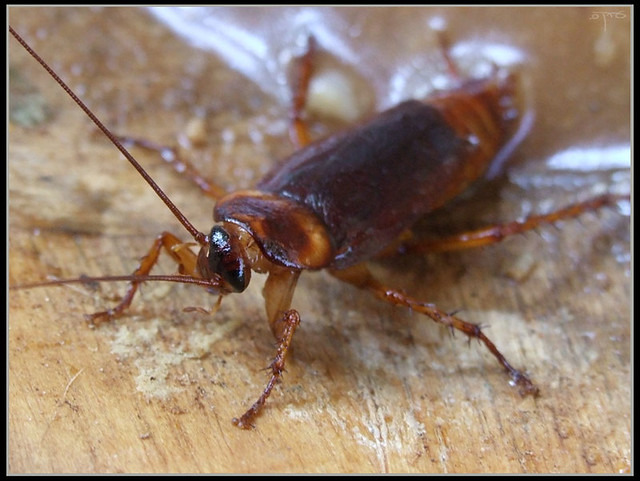
Living in rural Southern Virginia, we have a problem with ants, flies, and those disguisting creatures that peer at you from high up places with beady eyes and scurry across the floor while you're trying to eat dinner - cockroaches. We inherited them from the previous owner, and as anyone who lives in a mobile home knows, once the roaches have moved in, they make themselves comfortable and don't plan to move out. Ever.
My husband and I were making plans to call an exterminator, but as you can imagine, I was extremely leery of allowing anyone to spray chemicals in my home with two children and another one on the way. So I started researching natural pest control alternatives and, wonder of wonders, discovered that there are lots of ways to keep pests from getting into your home and garden in the first place, and a few ways to get rid of the ones that are already there.
Food Grade Diatomaceous Earth
Made of the remains of a historic algea that have fossilized, diatomaceous earth is an entirely natural and organic powder that is extremely effective at killing almost any pest that could plague your home. While it seems like a soft, fine powder to humans, to bugs it is actually a pile of microscopic razor blades that creates tiny cuts in their exoskeletons and causes them to die of dehydration within a day or two.
Sprinkle very small amounts wherever you see roaches, ants, earwigs, or even slugs, use it to create a barrier around the outside of your house, and rub a small amount into your pets' fur to kill fleas and lice. Apparently, you can also use it to make toothpaste, but I'm not sure I'm brave enough to try that. Make sure to wear gloves when you apply it just to be safe, and remember that a fine dusting is far more effective than piles of the stuff.
Boric Acid
While boric acid is a natural pest killer, and a very effective one at that, you may want to think twice about using it if you have children or pets in the house. Unlike food grade diatomaceous earth, it is considered toxic to humans and animals, and can be deadly if your one-year-old decides to stuff a handful into his mouth. If you choose to go with boric acid as a method of pest control, use it sparingly and in out-of-reach places (behind the fridge and stove, on the tops of your cabinets, etc.).
Fly Parasites
Farms, compost areas, and leech fields all tend to be serious problem areas when it comes to flies. This is because they are all areas where female flies prefer to lay their eggs. Fly parasites are tiny, non-stinging, non-biting bugs that will lay their own eggs in the fly pupa, or the cucoon that forms around maggots. The fly parasite eggs will hatch inside the pupa and eat the maggot before it can turn into a full-grown fly. Gross, but it's effective when you start to release the fly parasites early in the spring and continue to release them every few weeks throughout the summer.
Herbs
What can't herbs do? With a well-rounded herb garden, you can prevent and even cure some sicknesses, make almost any body product you could think of, soothe burns and cuts, clear acne, and season your food. It seems you can also repel pests with certain herbs.
Mint is particularly good at repelling almost every kind of bug, and will even keep away mice. I have grown mint behind my tomatoes for the past two years, and I have yet to see an aphid on them. Dill and basil are also excellent at keeping pests out of your garden, and even out of your home when you plant them in window boxes.
Essential Oils
Ode to the never-ending uses of essential oils, too. Balsam fir oil will send mice scurrying, peppermint oil is more potent than planted mint and more effective at targeting specific problem locations, and cinnamon and clove oil can be mixed in equal parts to keep away snakes. Even citronella oil is said to be far more effective at repelling mosquitoes than citronella candles. Keep a diffuser of citronella oil where you would normally put a candle, and spray a few drops of the oil mixed with water on your arms and legs in place of DEET spray.
Companion Planting
Even flowers can serve multiple purposes. Aside from simply looking good, many types of flowers are good at getting rid of specific pests. Marigold is one of the most common flowers used to keep destructive beetles away from your vegetables. I will be using nasturtium this year as a companion plant, both because I need a non-invasive climbing plant to make my privacy fence more private, and because the flowers and leaves are edible.
To make your companion planting most effective, research the types of garden pests you are trying to get rid of as well as the plants that are being destroyed by the pests. Companion plants can also be effective at attracting beneficial bugs that will prey on pests, or attracting pests to themselves in order to draw them away from your vegetables.
Prevention
As any pest control expert will tell you, the best method of pest control is prevention. Keep your yard clean and free of debris, keep logpiles well away from the house so you don't attract mice and snakes, keep your trashcans covered, seal up any cracks and other entrances that bugs might find into your home, and make sure you never leave food crumbs or even tiny amounts of water sitting out overnight. Once you have gotten rid of the pests with your own all-natural pest control solution, you don't want to do anything to invite them back!
No comments:
Post a Comment